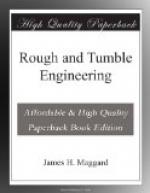When it becomes necessary to key up your brasses, you will find it a good safe way to loosen up the set screw which holds the key, then drive it down till you are satisfied you have it tight. Then drive it back again and then with your fist drive the key down as far as you can. You may consider this a peculiar kind of a hammer, but your boxes will rarely ever heat after being keyed in this manner.
KNOCK IN ENGINES
What makes an engine knock or pound? A loose pillow block box is a good “knocker.” The pillow block is a box next crank or disc wheel. This box is usually fitted with set bolts and jam nuts. You must also be careful not to set this up too tight, remembering always that a box when too tight begins to heat and this expands the journal, causing greater friction. A slight turn of a set bolt one way or the other may be sufficient to cool a box that may be running hot, or to heat one that may be running cool. A hot box from neglect of oiling can be cooled by supplying oil, provided it has not already commenced to cut. If it shows any sign of cutting, the only safe way is to remove the box and clean it thoroughly.
Loose eccentric yokes will make a knock in an engine, and it may appear to be in the wrist. You will find packing between the two halves of the yoke. Take out a thin sheet of this packing, but don’t take out too much, as you are liable then to get them too tight and they may stick and cause your eccentrics to slip. We will have more to say about the slipping of the eccentrics.
The piston rod loose in cross-head will make a knock, which also appears in the wrist, but it is not there. Tighten the piston and you will stop it. The piston rod may be keyed in cross head, or it may be held in place by a nut. The key is less liable to get loose, but should it work loose a few times it may be necessary to replace it with a new one. And this is one of the things that cause a bad break when it works out or gets loose. If it gets loose it may not come out, but it will not stand the strain very long in this condition, and will break, allowing the piston to come out of cross head, and you are certain to knock out one cylinder head and possibly both of them. The nut will do the same thing if allowed to come off. So this is one of the connections that will claim your attention once in a while, but if you train your ear to detect any unusual noise you will discover it as soon as it gives the least in either key or nut.
The cross-head loose in the guides will make it knock. If the cross-head is not provided for taking up this wear, you can take off the guides and file them enough to allow them to come up to the cross-head, but it is much better to have them planed off, which insures the guides coming up square against the cross-head and thus prevent any heating or cutting.
A loose fly-wheel will most likely puzzle you more than anything else to find the knock. So remember this. The wheel may apparently be tight, but should the key be the least bit narrow for the groove in shaft, it will make your engine bump very similar to that caused by too much or too little “lead.”




